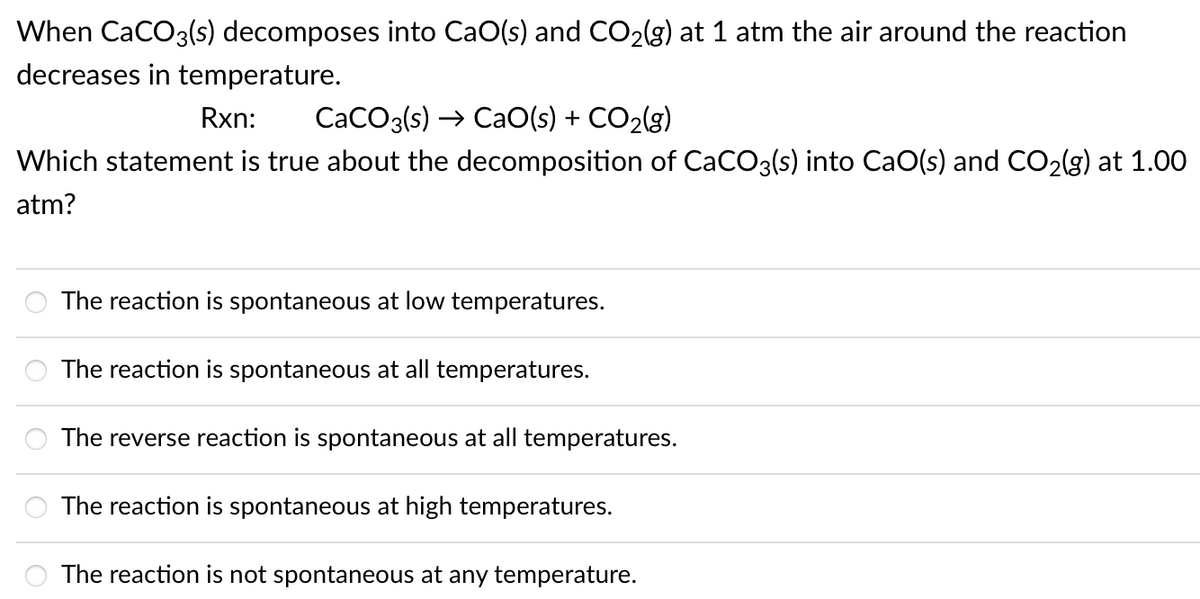acU3(S) decomposes lhto (S) and CO21g) at 1 atm the air around the reaction decreases in temperature. Rxn: CaCO3(s) → CaO(s) + CO2(g) Which statement is true about the decomposition of CaCO3(s) into CaO(s) and CO2(g) at 1.00 atm? The reaction is spontaneous at low temperatures. The reaction is spontaneous at all temperatures. The reverse reaction is spontaneous at all temperatures.
acU3(S) decomposes lhto (S) and CO21g) at 1 atm the air around the reaction decreases in temperature. Rxn: CaCO3(s) → CaO(s) + CO2(g) Which statement is true about the decomposition of CaCO3(s) into CaO(s) and CO2(g) at 1.00 atm? The reaction is spontaneous at low temperatures. The reaction is spontaneous at all temperatures. The reverse reaction is spontaneous at all temperatures.
General Chemistry - Standalone book (MindTap Course List)
11th Edition
ISBN:9781305580343
Author:Steven D. Gammon, Ebbing, Darrell Ebbing, Steven D., Darrell; Gammon, Darrell Ebbing; Steven D. Gammon, Darrell D.; Gammon, Ebbing; Steven D. Gammon; Darrell
Publisher:Steven D. Gammon, Ebbing, Darrell Ebbing, Steven D., Darrell; Gammon, Darrell Ebbing; Steven D. Gammon, Darrell D.; Gammon, Ebbing; Steven D. Gammon; Darrell
Chapter18: Thermodynamics And Equilibrium
Section: Chapter Questions
Problem 18.121QP
Related questions
Question

Transcribed Image Text:When CaCO3(s) decomposes into CaO(s) and CO2(g) at 1 atm the air around the reaction
decreases in temperature.
Rxn:
CaCO3(s) → CaO(s) + CO2(g)
Which statement is true about the decomposition of CaCO3(s) into CaO(s) and CO2(g) at 1.00
atm?
The reaction is spontaneous at low temperatures.
The reaction is spontaneous at all temperatures.
The reverse reaction is spontaneous at all temperatures.
The reaction is spontaneous at high temperatures.
The reaction is not spontaneous at any temperature.
Expert Solution
This question has been solved!
Explore an expertly crafted, step-by-step solution for a thorough understanding of key concepts.
This is a popular solution!
Trending now
This is a popular solution!
Step by step
Solved in 2 steps

Knowledge Booster
Learn more about
Need a deep-dive on the concept behind this application? Look no further. Learn more about this topic, chemistry and related others by exploring similar questions and additional content below.Recommended textbooks for you

General Chemistry - Standalone book (MindTap Cour…
Chemistry
ISBN:
9781305580343
Author:
Steven D. Gammon, Ebbing, Darrell Ebbing, Steven D., Darrell; Gammon, Darrell Ebbing; Steven D. Gammon, Darrell D.; Gammon, Ebbing; Steven D. Gammon; Darrell
Publisher:
Cengage Learning

Chemistry
Chemistry
ISBN:
9781305957404
Author:
Steven S. Zumdahl, Susan A. Zumdahl, Donald J. DeCoste
Publisher:
Cengage Learning


General Chemistry - Standalone book (MindTap Cour…
Chemistry
ISBN:
9781305580343
Author:
Steven D. Gammon, Ebbing, Darrell Ebbing, Steven D., Darrell; Gammon, Darrell Ebbing; Steven D. Gammon, Darrell D.; Gammon, Ebbing; Steven D. Gammon; Darrell
Publisher:
Cengage Learning

Chemistry
Chemistry
ISBN:
9781305957404
Author:
Steven S. Zumdahl, Susan A. Zumdahl, Donald J. DeCoste
Publisher:
Cengage Learning


Chemistry: An Atoms First Approach
Chemistry
ISBN:
9781305079243
Author:
Steven S. Zumdahl, Susan A. Zumdahl
Publisher:
Cengage Learning

Chemistry & Chemical Reactivity
Chemistry
ISBN:
9781337399074
Author:
John C. Kotz, Paul M. Treichel, John Townsend, David Treichel
Publisher:
Cengage Learning

Chemistry & Chemical Reactivity
Chemistry
ISBN:
9781133949640
Author:
John C. Kotz, Paul M. Treichel, John Townsend, David Treichel
Publisher:
Cengage Learning